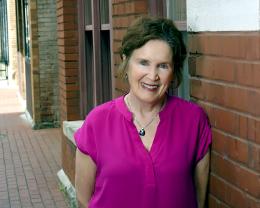Disturbed
creative nonfiction by Sheila McEntee
~
I am out for a walk just after dawn, taking spritely steps, my dog keeping pace beside me. In the cool, late-summer morning, I breathe deeply, anticipating the good day ahead. As always, I’ve written a lengthy list of things to accomplish, which I recount as I walk: return emails, send invoices, pay mortgage, get groceries, and on and on.
~
We hear no footfall. He is like a ghost, hovering just above our heads. We first hear his voice, but it is soft, and neither of us can make out his words. We turn, still seated, and look at him. His face is aged and grizzled, with several days’ growth of grey beard. His eyes are a soft, denim blue, and in them I see fear and confusion.
“I’m sorry, I can’t help you,” I tell him. I motion with my eyes to my friend, saying, “Let’s go.”
~
For many moments the bird and I pause on the gravel, each in our own distress. My thoughts range to a notion I’ve considered, uncomfortably, in recent weeks: Have I become an automaton, early to rise and armed with a list, who relishes the deep satisfaction of a checked-off thing, and who is, ultimately, reluctant to be disturbed?
I look at the man and say nothing. I feel somehow disoriented, like I’ve been shaken awake from a pleasant dream I did not want to end. For many more moments, I say nothing.
“I need help,” he says. “Can you call the police?”
Just 50 yards behind us is a police station. It sits adjacent to the downtown plaza.
“The police station is right there,” I tell him matter-of-factly, pointing with a sweep of my arm.
“I went and there’s nobody there,” he says. His pleading eyes search my face.
I look at the police station and, incredibly, on this Saturday night, it is shuttered. There is only soft light behind the windows. No one goes in or comes out.
I look at the man and say nothing. I feel somehow disoriented, like I’ve been shaken awake from a pleasant dream I did not want to end. For many more moments, I say nothing.
“I’ve got cancer in my head,” the man says. “I need help.”
Just then, another concert-goer, a clean-cut, balding, 40-something man in crisp jeans and a green cotton shirt, steps up behind us and says, “Is there a problem here, ladies?”
~
In winter, robins travel in flocks of thousands. As the weather warms, we see them in our yards, hopping about, seeking worms and seeds in spring-damp soil. Indeed, they are common, and to wildlife watch groups, a species of “low concern.” That is why, when I call the local veterinary hospital that treats wild birds and ask “Do you take injured robins?” I do not expect a “yes.” Yet, the one I hear is so emphatic, I hang up quickly. I put an old towel in a box. I grab a pair of gloves.
When I return to the neighbor’s parking pad, I see that the bird has moved only a few feet. I reach down gently for it, but it alludes me time and again, finally hopping across the street and into a deep patch of English ivy in front of a white picket fence. The bird sinks into the ivy and disappears. I can tell it is there only by the quivering of one tender, new leaf.
~
We tell the jeans-clad man that the old man needs help, but the police station is closed. The old man’s eyes meet those of the younger one and they trade puzzled looks.
~
Now morning traffic has picked up. I begin to doubt if I can capture the bird by myself. I go back home again and call a friend who lives around the corner. In minutes she is at my door. We slip on gloves and head up the street. When we reach the ivy, we crouch down together. I point out the leaf that is now barely quivering.
~
We watch as the old man pushes his walker up the accessible ramp to the police station door, where there is an overhang. Perhaps he will stay there the night, so that in the morning, someone will find him and help him.
~
~
At home, after the concert, I climb into bed. My dog follows me, curling himself snugly at the foot. I think about the old man lying on the concrete in front of the police station. I wonder if anyone will find him in the morning and help him—offer him a hot cup of coffee, a kind word. I imagine him drifting into his day unmoored, like a neglected rowboat tossed by a storm, not knowing from one moment to the next what the tide will bring. As I lie awake, the few words I said to him—“I can’t help you”—haunt me. After a long while, I fall asleep, considering life’s blessings and cruel turns, and what it means, for some, to be alone.

Sheila McEntee is a writer, editor, and naturalist living in Charleston, West Virginia. Her essays have been featured in Stonecrop Review; The Brevity Blog; Woods Reader; A COVID 19 Anthology; and Voices on Unity: Coming Together, Falling Apart, among other publications, and also aired on West Virginia Public Radio. Sheila wrote for Wonderful West Virginia magazine for many years and from 2006 to 2014 was that publication’s editor. She was raised in Cheverly, Maryland, and Hingham, Massachusetts, but says she’s done a lot of growing up since moving to West Virginia in 1989. Her first book of essays, Soul Friend and Other Love Notes to the Natural World, is forthcoming from Blackwater Press in early 2025.
